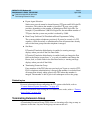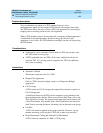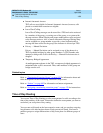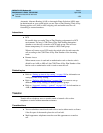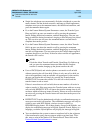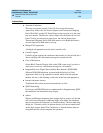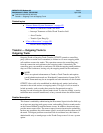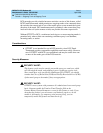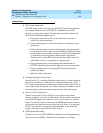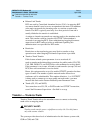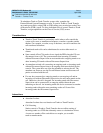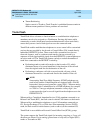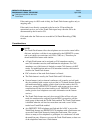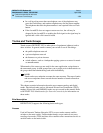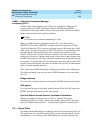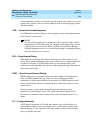
DEFINITY ECS Release 8.2
Administrator’s Guide
555-233-506
Issue 1
April 2000
Features and technical reference
1559Transfer — Outgoing Trunk to Outgoing Trunk
20
Interactions
■ DCS Trunk Turnaround
OTTOTT increases the set of cases in which DCS Trunk Turnaround may
be accepted. However, use of OTTOTT in combination with a DCS
network is strongly discouraged. The following algorithm describes the
DCS Trunk Turnaround request process.
a. If any party on the call receives a local-dial, busy, intercept, or
reorder tone, deny turnaround.
b. If any remaining party is an answered station or attendant, accept
turnaround.
c. If any remaining party is on an incoming trunk, accept turnaround.
For the purposes of this check, an outgoing DCS trunk that has been
turned around an odd number of times via a DCS trunk turnaround
is considered an incoming trunk with disconnect supervision.
Similarly, an incoming DCS trunk that has been turned around an
odd number of times is considered an outgoing trunk.
d. If any remaining party is an outgoing trunk administered for
OTTOTT that has received answer supervision, accept turnaround.
e. If any remaining party is an outgoing DCS trunk, forward the
turnaround request.
f. Otherwise, deny turnaround.
■ Incoming Disconnect Supervision
Outside of the U.S., incoming disconnect supervision is a switch capability
that restricts transfers or conferences for certain incoming trunks. In the
U.S., all incoming trunks are assumed to provide disconnect supervision. In
some countries this assumption is not valid, so administer whether or not an
incoming trunk provides disconnect supervision for each trunk group.
■ Personal Central Office Lines
Transfer of personal CO lines (PCOLs) is not subject to the normal
restrictions applied to transfer of other trunks. These transfers are allowed
since the PCOL appearance remains on one or more stations as a feature
button. System users must be aware that the DROP button cannot be used
to disconnect the transferred-to party from the call. Hence, if an outgoing
PCOL is transferred to an outgoing trunk and neither of the trunks can
supply a disconnect signal, the two trunks lock up.
■ QSIG Global Networking
If either call is over an ISDN-PRI trunk administered with Supplementary
Service Protocol b (QSIG), additional call information may display.



